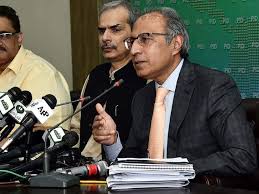Measures introduced to promote agriculture sector

Islamabad: Adviser to Prime Minister on Finance Dr Abdul Hafeez Shaikh on Saturday reiterated the government resolve to protect and promote the local agriculture sector to maintain food safety and security in the country.
Addressing the post budget press conference, he said that COVID-19 pandemic had badly effected the all segments of national economy as the accumulated initial losses to national GDP were estimated at Rs3,000 billion.
He said that the government had announced a stimulus package to protect its people as well as for the revival of trade and industrial sector in the country with a total cost of Rs1,200 billion.
He said that an amount of Rs 280 billion was allocated for wheat procurement, adding that this amount would help the farmers to purchase the agriculture tools, inputs and other necessities.
Dr Hafeez said that an amount of Rs50 billion was allocated in order to provide fertilizers on subsidized rates to farmers for enhancing the output of their produces.Dr Abdul Hafeez Shaikh said despite limited resources and COVID-19 pandemic, the government had tried to provide maximum relief to common man in the 2020-21 budget.
He said it had inherited a deteriorated economy with increasing imports, decreasing exports, depleting foreign exchange reserves, and widening current account and fiscal deficits.
The foreign exchange reserves were under immense pressure due to increasing imports and decreasing exports while the current account deficit had swelled to $20 billion, which was brought down to $3 billion by the current government, he added.
The advisor said the government took tough decisions and introduced fiscal and financial discipline, besides reducing all non-developmental expenditures to bring economic stability.
Due to the continuous efforts, he said, the economic indicators had started showing resilience and the revenue collection witnessed remarkable increase of 17% while non-tax income reached Rs 1,600 billion.
He said the government’s economic reforms programme was widely hailed by the international credit rating agencies and development partners, including the International Monetary Fund, the World Bank and the Moody’s.
The recognition of international forums had restored the confidence of both local and foreign investors as foreign investment showed about 137% growth, he added.
All the government efforts, he said, were dented with the emergence of COVID-19 pandemic, which had also affected the global economy as well as millions of people.
He said according to the IMF estimates, the overall global income was likely to decrease by 1.4%, and that situation also had a negative impact on Pakistan’s local trade and industrial sectors.
The pandemic had caused the loss of about Rs 3,000 billion to national economy affecting gross domestic product growth, and revenues were also decreased by Rs 700 billion, he said, adding due to the industrial lockdown, many people were deprived of their livelihood, while poverty and unemployment had increased.
The advisor said despite limited resources, the government launched a relief programme to provide financial assistance to the people to fulfill their daily needs. Over 10 million people without any political, regional or religious discrimination, had benefited from the programme, which was executed in an transparent manner.
He said in order to promote the agriculture sector, the government had decided to procure wheat for Rs 280 million which would help the farmers to fulfill their needs. The government had also allocated Rs 50 billion for the subsidy on fertilizers, he added.
He said the government had also provided financial assistance to small enterprises, which were affected hard due to the pandemic.
Over 600,000 businesses were benefited from the programme, he added.





